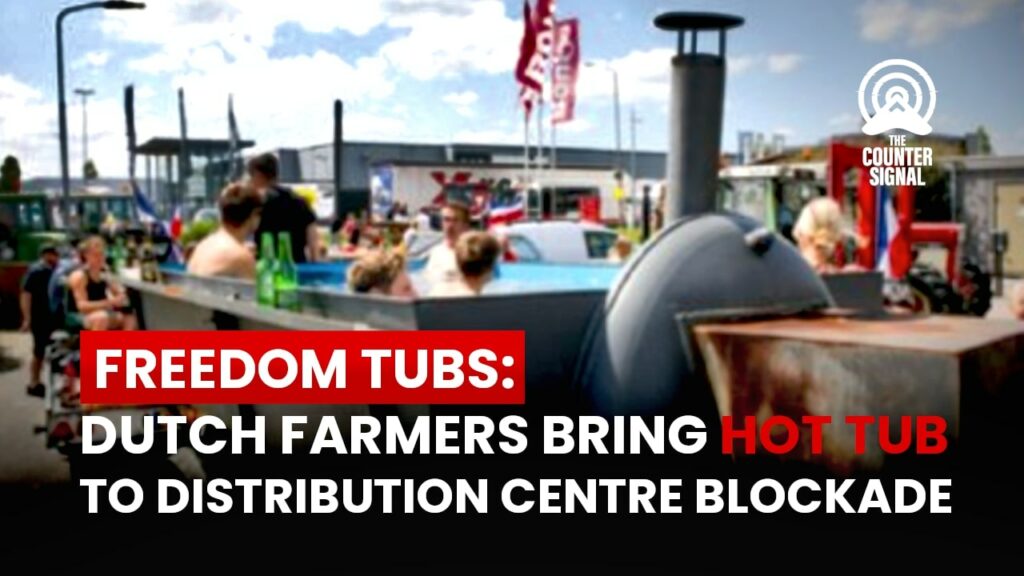Dutch farmers have begun blocking food distribution centres across the Netherlands, with some trucks lugging hot tubs to the protests — a harkening back to the Canadian Freedom Convoy.

Up to 20 food distribution centres have been blocked by trucks and tractors as of July 4, including those in Nieuwegein, Drachten, Heerenveen, Zwolle, Veghel, Breda, Beilen, Woerden, Nijkerk, and Geldermalsen.
Holland towards total paralysis. Tens of thousands of Dutch farmers block distribution centers and roads everywhere.#DutchFarmers #FarmersProtest #boerenopstand #Boerenprotest #Farmersdefenceforce #boerenprotesten #boerenzakdoek #boerenterreur pic.twitter.com/omFR1e2cSV
— WeAreProtestors (@WeAreProtestors) July 4, 2022
Besides hot tubs, other farmers brought picnic tables and were photographed casually drinking coffee in front of the Boni distribution centre in Nijkerk.
Protesterende boeren hebben maandagochtend het distributiecentrum van de Boni in Nijkerk geblokkeerd pic.twitter.com/JGwEbjJxgA
— Jelle Veenstra (@Veenstraaa) July 4, 2022
The Dutch Central Food Trade Agency (CBL) has denounced the protests and called on the government to resolve the conflict immediately.
“These blockades are unacceptable,” the CBL wrote in a statement. “The CBL previously called on the government and farmers to use the dialogue and resolve the conflict. The farmers have a conflict with the government about nitrogen, [and] the members of the CBL are not involved. Blockades of distribution centers hurt the citizens of the Netherlands.”
“Supermarkets are doing everything they can to keep the stores stocked. But when such blockages last longer, it can mean that the daily shopping can no longer be done.”
Dutch farmers have also blockaded highways, going so far as creating a massive tractor chain and unloading manure on the road to shut down the Netherlands-Germany border.
Netherlands 🇳🇱
— James Melville (@JamesMelville) June 30, 2022
Dutch farmers are blocking the border between Netherlands and Germany in protest against the government decision to reduce nitrogen by 30% – 70% to comply with EU regulations on nitrogen pollution.pic.twitter.com/Je1fMxAx30
Dutch farmers close the border between Holland and Germany with tons of manure to protest nitrogen cuts
— Art TakingBack 🇺🇸 (@ArtValley818_) July 4, 2022
pic.twitter.com/EKinVfW2Yw
Dutch farmers are now in REVOLT against their GLOBALIST government’s nitrogen policy. Fisherman have now joined them. Ports and roads are being blockaded nationally.
— Maajid أبو عمّار (@MaajidNawaz) July 4, 2022
It is on
Pakistan to the Netherlands, the revolution will not be televised.#RESIST pic.twitter.com/LD6aVqfU72 https://t.co/SlcbPEZL5q
Additionally, fishermen have joined in the protest, working together to shut down various ports across the country.
Dutch fisherman join the farmers protests by blocking major ports. pic.twitter.com/UkJ6xVhsdh
— Andy 🏴🇬🇧 #KBF (@68dicky) July 4, 2022
As previously reported by The Counter Signal, Dutch farmers and now fishermen are protesting a business-destroying green policy which will require businesses to reduce nitrogen emissions nationwide by 50% and up to 95% in some provinces by 2030, with cows and fertilizers being significant contributors.
“The honest message … is that not all farmers can continue their business,” a government statement reads.
The agriculture industry isn’t the only one being targeted, though — aviation has also come under fire, and it’s expected those in the industry will join the farmers in protest.
According to Climate Change News, by the end of 2023, Schipol airport, one of the busiest in Europe, will be forced to limit annual flights to accommodate just 440,000 passengers (12% less than the number of flights in 2019).
“This is a difficult message for the aviation sector that is still recovering from the far-reaching consequences of the coronavirus pandemic,” said transport minister Mark Harbers.












